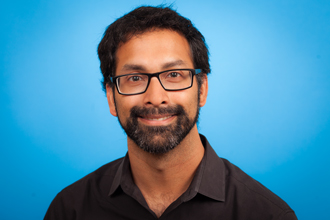‘Disabilities are not always apparent or visible’

By Jennifer Stranges

Dr. Andrew Pinto
Over one billion people globally experience some form of disability, yet despite having greater health needs, people with disabilities often encounter barriers to accessing care and have worse outcomes.
In a study published in Disability and Health Journal, Dr. Andrew Pinto and Dr. Tara Kiran, family physicians with St. Michael’s Hospital’s Academic Family Health Team and researchers at the Li Ka Shing Knowledge Institute, examined how patients responded to being asked about disabilities as part of a routine survey and compared survey responses to data available in medical charts.
We caught up with Dr. Pinto, who director of Upstream Lab, to learn about the study, if patients were receptive to answering questions about disabilities, and why that’s significant to health care providers.
What did you study and why?
We set out to study how patients reacted to being asked about disabilities. This was happening as part of routine data collection in our Family Health Team to better understand who we serve. We asked more than 15,000 patients questions about a range of sociodemographics and social needs.
People with disabilities are diverse and heterogeneous, but research has consistently found disparities in health. Disabilities are not always apparent or visible, even to health providers. There has been growing interest in routinely identifying which patients have specific disabilities in order to identify disparities and take action to reduce them.
What were your major findings?
We found that most patients were willing to answer a question about disabilities. However, when we compared responses to medical records, we found that patients may have chosen not to disclose certain disabilities. When we interviewed patients, we found that there was confusion around some of the options – for example, what constituted a chronic condition – and patients were less likely to report mental illness and addictions due to stigma.
Were there any surprises?
I think we were most surprised at how the interpretation of the question differed – patients were not sure whether their health conditions fit into the categories provided. Also, if a condition was under good control and being managed, such as diabetes or HIV, patients did not view themselves as living with a disability, which certainly makes sense.
What’s next for this research?
We are now working with numerous partners across Canada on a large study to create a national standard for collecting data on sociodemographics and social needs. We’ve changed the question in the survey that asks, “Do you have any of the following disabilities?” to one that focuses more on barriers to care that a patient may face, such as hearing, vision, learning, or motor function. We think this updated language will cause less confusion, be less stigmatizing, and may be more actionable by health organizations.
About St. Michael’s Hospital
St. Michael’s Hospital provides compassionate care to all who enter its doors. The hospital also provides outstanding medical education to future health care professionals in more than 27 academic disciplines. Critical care and trauma, heart disease, neurosurgery, diabetes, cancer care, care of the homeless and global health are among the Hospital’s recognized areas of expertise. Through the Keenan Research Centre and the Li Ka Shing International Healthcare Education Centre, which make up the Li Ka Shing Knowledge Institute, research and education at St. Michael’s Hospital are recognized and make an impact around the world. Founded in 1892, the hospital is fully affiliated with the University of Toronto.
About Unity Health Toronto
Unity Health Toronto, comprised of Providence Healthcare, St. Joseph’s Health Centre and St. Michael’s Hospital, works to advance the health of everyone in our urban communities and beyond. Our health network serves patients, residents and clients across the full spectrum of care, spanning primary care, secondary community care, tertiary and quaternary care services to post-acute through rehabilitation, palliative care and long-term care, while investing in world-class research and education. For more information, visit www.unityhealth.to.
